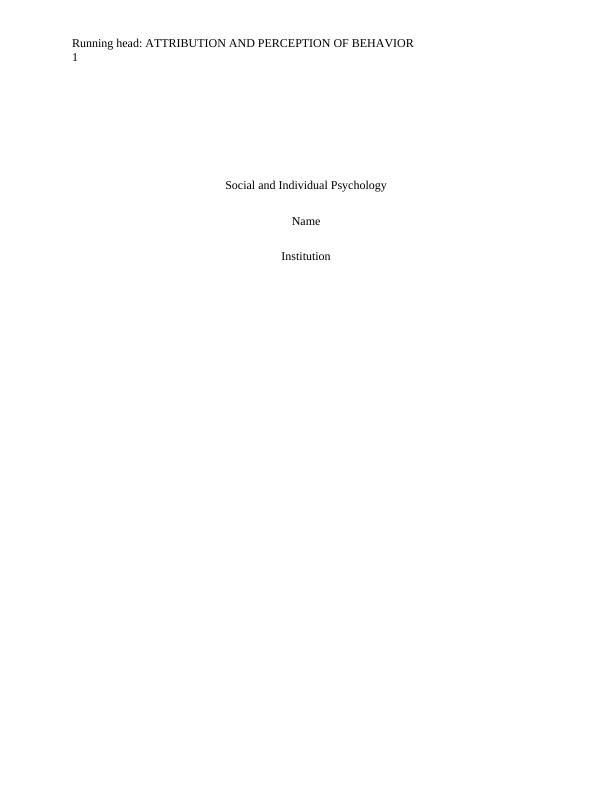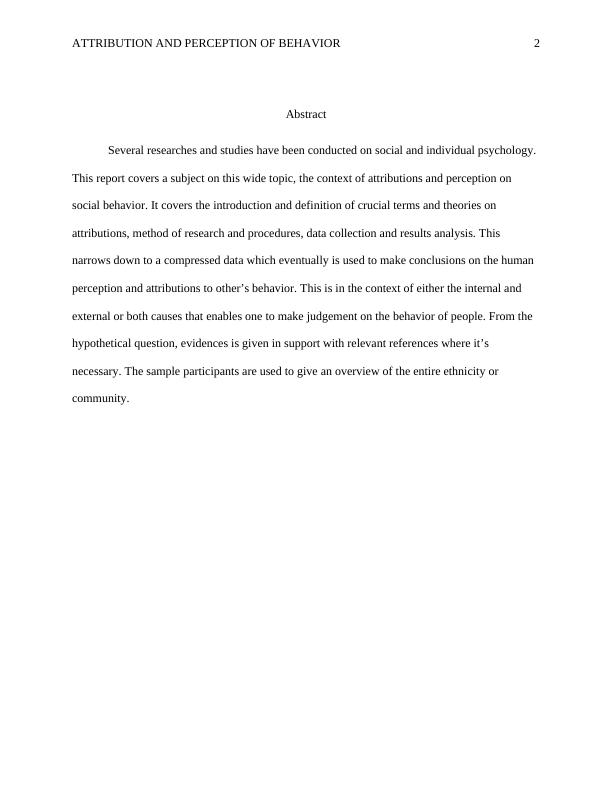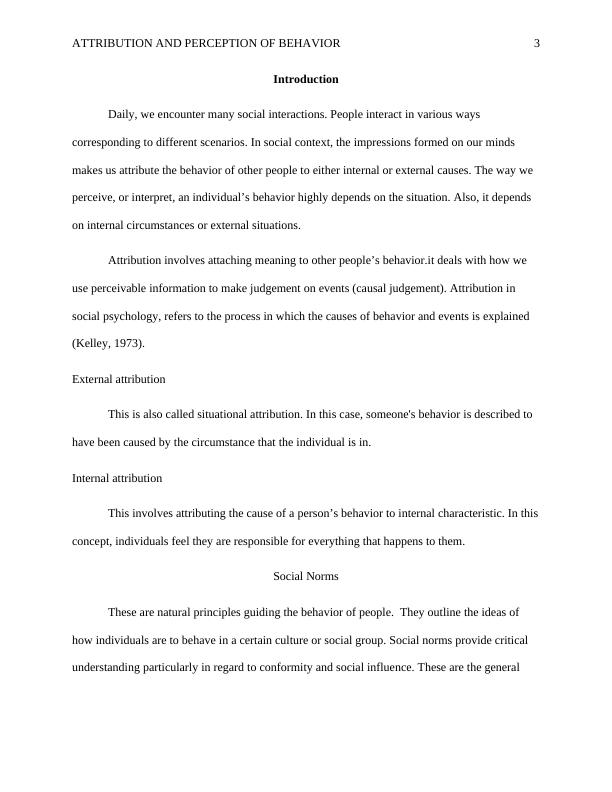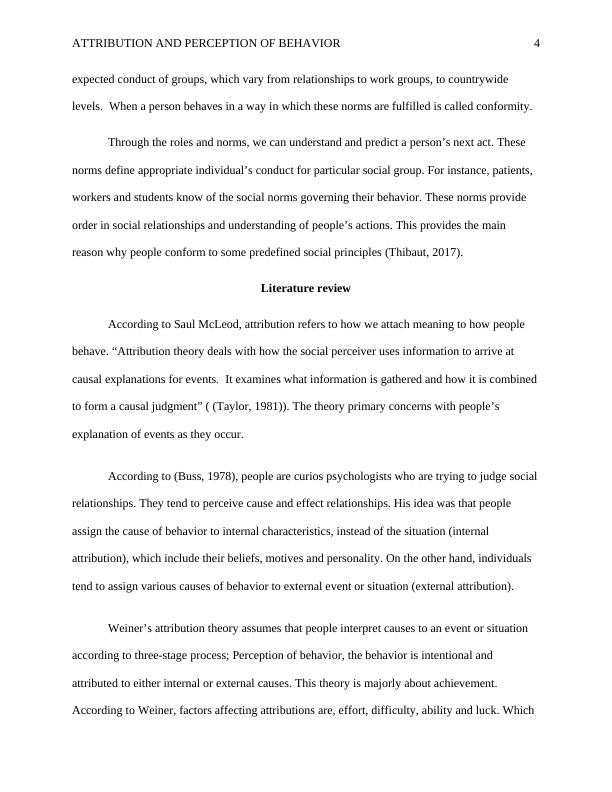Attribution and Perception of Behavior in Social and Individual Psychology
Added on 2023-06-04
14 Pages2918 Words402 Views
Running head: ATTRIBUTION AND PERCEPTION OF BEHAVIOR
1
Social and Individual Psychology
Name
Institution
1
Social and Individual Psychology
Name
Institution

ATTRIBUTION AND PERCEPTION OF BEHAVIOR 2
Abstract
Several researches and studies have been conducted on social and individual psychology.
This report covers a subject on this wide topic, the context of attributions and perception on
social behavior. It covers the introduction and definition of crucial terms and theories on
attributions, method of research and procedures, data collection and results analysis. This
narrows down to a compressed data which eventually is used to make conclusions on the human
perception and attributions to other’s behavior. This is in the context of either the internal and
external or both causes that enables one to make judgement on the behavior of people. From the
hypothetical question, evidences is given in support with relevant references where it’s
necessary. The sample participants are used to give an overview of the entire ethnicity or
community.
Abstract
Several researches and studies have been conducted on social and individual psychology.
This report covers a subject on this wide topic, the context of attributions and perception on
social behavior. It covers the introduction and definition of crucial terms and theories on
attributions, method of research and procedures, data collection and results analysis. This
narrows down to a compressed data which eventually is used to make conclusions on the human
perception and attributions to other’s behavior. This is in the context of either the internal and
external or both causes that enables one to make judgement on the behavior of people. From the
hypothetical question, evidences is given in support with relevant references where it’s
necessary. The sample participants are used to give an overview of the entire ethnicity or
community.

ATTRIBUTION AND PERCEPTION OF BEHAVIOR 3
Introduction
Daily, we encounter many social interactions. People interact in various ways
corresponding to different scenarios. In social context, the impressions formed on our minds
makes us attribute the behavior of other people to either internal or external causes. The way we
perceive, or interpret, an individual’s behavior highly depends on the situation. Also, it depends
on internal circumstances or external situations.
Attribution involves attaching meaning to other people’s behavior.it deals with how we
use perceivable information to make judgement on events (causal judgement). Attribution in
social psychology, refers to the process in which the causes of behavior and events is explained
(Kelley, 1973).
External attribution
This is also called situational attribution. In this case, someone's behavior is described to
have been caused by the circumstance that the individual is in.
Internal attribution
This involves attributing the cause of a person’s behavior to internal characteristic. In this
concept, individuals feel they are responsible for everything that happens to them.
Social Norms
These are natural principles guiding the behavior of people. They outline the ideas of
how individuals are to behave in a certain culture or social group. Social norms provide critical
understanding particularly in regard to conformity and social influence. These are the general
Introduction
Daily, we encounter many social interactions. People interact in various ways
corresponding to different scenarios. In social context, the impressions formed on our minds
makes us attribute the behavior of other people to either internal or external causes. The way we
perceive, or interpret, an individual’s behavior highly depends on the situation. Also, it depends
on internal circumstances or external situations.
Attribution involves attaching meaning to other people’s behavior.it deals with how we
use perceivable information to make judgement on events (causal judgement). Attribution in
social psychology, refers to the process in which the causes of behavior and events is explained
(Kelley, 1973).
External attribution
This is also called situational attribution. In this case, someone's behavior is described to
have been caused by the circumstance that the individual is in.
Internal attribution
This involves attributing the cause of a person’s behavior to internal characteristic. In this
concept, individuals feel they are responsible for everything that happens to them.
Social Norms
These are natural principles guiding the behavior of people. They outline the ideas of
how individuals are to behave in a certain culture or social group. Social norms provide critical
understanding particularly in regard to conformity and social influence. These are the general

ATTRIBUTION AND PERCEPTION OF BEHAVIOR 4
expected conduct of groups, which vary from relationships to work groups, to countrywide
levels. When a person behaves in a way in which these norms are fulfilled is called conformity.
Through the roles and norms, we can understand and predict a person’s next act. These
norms define appropriate individual’s conduct for particular social group. For instance, patients,
workers and students know of the social norms governing their behavior. These norms provide
order in social relationships and understanding of people’s actions. This provides the main
reason why people conform to some predefined social principles (Thibaut, 2017).
Literature review
According to Saul McLeod, attribution refers to how we attach meaning to how people
behave. “Attribution theory deals with how the social perceiver uses information to arrive at
causal explanations for events. It examines what information is gathered and how it is combined
to form a causal judgment” ( (Taylor, 1981)). The theory primary concerns with people’s
explanation of events as they occur.
According to (Buss, 1978), people are curios psychologists who are trying to judge social
relationships. They tend to perceive cause and effect relationships. His idea was that people
assign the cause of behavior to internal characteristics, instead of the situation (internal
attribution), which include their beliefs, motives and personality. On the other hand, individuals
tend to assign various causes of behavior to external event or situation (external attribution).
Weiner’s attribution theory assumes that people interpret causes to an event or situation
according to three-stage process; Perception of behavior, the behavior is intentional and
attributed to either internal or external causes. This theory is majorly about achievement.
According to Weiner, factors affecting attributions are, effort, difficulty, ability and luck. Which
expected conduct of groups, which vary from relationships to work groups, to countrywide
levels. When a person behaves in a way in which these norms are fulfilled is called conformity.
Through the roles and norms, we can understand and predict a person’s next act. These
norms define appropriate individual’s conduct for particular social group. For instance, patients,
workers and students know of the social norms governing their behavior. These norms provide
order in social relationships and understanding of people’s actions. This provides the main
reason why people conform to some predefined social principles (Thibaut, 2017).
Literature review
According to Saul McLeod, attribution refers to how we attach meaning to how people
behave. “Attribution theory deals with how the social perceiver uses information to arrive at
causal explanations for events. It examines what information is gathered and how it is combined
to form a causal judgment” ( (Taylor, 1981)). The theory primary concerns with people’s
explanation of events as they occur.
According to (Buss, 1978), people are curios psychologists who are trying to judge social
relationships. They tend to perceive cause and effect relationships. His idea was that people
assign the cause of behavior to internal characteristics, instead of the situation (internal
attribution), which include their beliefs, motives and personality. On the other hand, individuals
tend to assign various causes of behavior to external event or situation (external attribution).
Weiner’s attribution theory assumes that people interpret causes to an event or situation
according to three-stage process; Perception of behavior, the behavior is intentional and
attributed to either internal or external causes. This theory is majorly about achievement.
According to Weiner, factors affecting attributions are, effort, difficulty, ability and luck. Which

End of preview
Want to access all the pages? Upload your documents or become a member.
Related Documents
Social Norm - Analysis of Social Norms and Conformitylg...
|7
|1722
|188
Influence of Perception and Impression Management on Behaviorlg...
|3
|1158
|26
Cultural Exercise: Role of Culture on Attributionlg...
|4
|698
|422
Assignment on Social Psychology Samplelg...
|6
|2098
|38
Organizational Behavior - Perception In Organization - Deskliblg...
|10
|2979
|55
Attribution Theory of Human Communicationlg...
|8
|1762
|491
